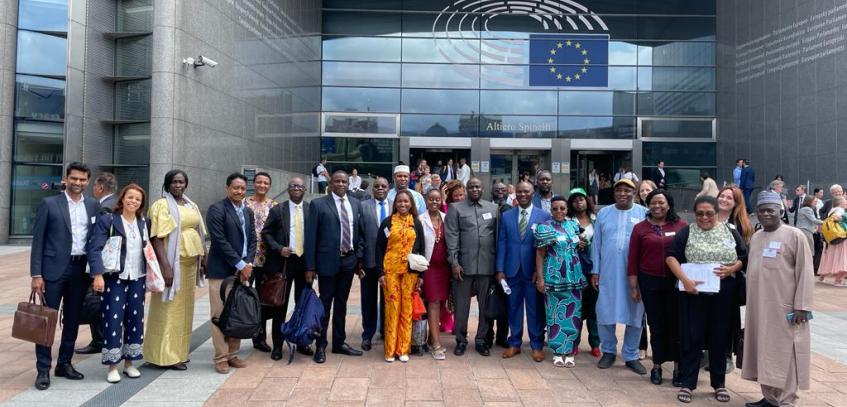On 28-29 June 2023, the European Economic and Social Committee (EESC) in partnership with the African Union Economic, Social and Cultural Council (AU ECOSOCC) hosted the eighth meeting of the Africa-European Union Economic and Social Stakeholders' Network. In the framework of the Joint Africa-EU Strategy (JAES), the EESC organises regular consultations to convey the views of organised civil society to the partnership between the AU and the European Union (EU) in the form of Meetings of the African-EU Economic and Social Stakeholders' Network.
ECOSOCC was represented by Presiding Officer, Khalid Boudali, Head of Secretariat, William Carew and Head of Programs, Nana Osei. The meeting was also attended by representatives of the Caribbean and Pacific regions, members of the ACP-EU Follow-up Committee.
The representatives of African and EU economic and social stakeholders met to discuss the post-Cotonou agreement and the involvement of economic and social partners; water and nutrition and critical raw materials.
The meeting noted with deep concern, the delay in signing the post-Cotonou agreement and urgently called on the Council of the EU to swiftly find a solution to the deadlock hindering the signing of the agreement.
The meeting recognized the importance of stakeholders' participation in the new Partnership Agreement between the EU and the OACPS and called for an inclusive definition of stakeholders, covering all sectors of civil society, economic actors and social partners and called for a swift implementation of the provisions of the agreement related to stakeholder engagement, once the new agreement is in place.
The meeting supported the recommendations on the role of civil society made in the statement adopted by the ACP-EU Follow-up Committee in Porto in March 2021 , including that four institutional mechanisms should be set up, namely: one related to the common foundation that would work as an "umbrella" for the other mechanisms; a second one directed towards Africa and underpinned by the EU-Africa Protocol; a third one targeting the Caribbean and built up on the EU-Caribbean Protocol; and a fourth one directed towards the Pacific and underpinned by the EU-Pacific Protocol.
The meeting further recalled the importance of involving civil society and social partners, in all agreements between the EU and AU/ACP countries (including trade agreements, such as Economic Partnership Agreements and Sustainable Investment Facilitation Agreements).
“In the framework of the EU-AU Partnership, we call for the parties to use extensively the expertise of the EESC and the AU ECOSOCC as representative bodies of the interests of civil society in the EU and in the AU, without exclusion of autonomous processes of civil society participation,” they stated.
On Water and Nutrition, the meeting underlined the crucial relationship between water sustainability and food security and noted that as a transversal resource, freshwater was also essential to a wide range of economic activities, including agriculture, fisheries, industries, tourism, energy and transport.
On critical raw materials, the meeting underlined the importance of fostering a mutually beneficial partnership in addressing the sustainable production, extraction and trade of critical raw materials, within the scope of national and regional economic plans. It called on the EU and AU to invest in research, development, and innovation both in the EU and AU to address critical raw material challenges and to enhance their collaboration in such projects, notably through knowledge sharing, technical assistance and capacity building, to foster sustainable development and promote local value addition in supply chains.
Mr. Boudali said of the meeting that, “the concept of partnership has a profound meaning when we embrace the valuable insights and contributions from diverse sectors of society.”





